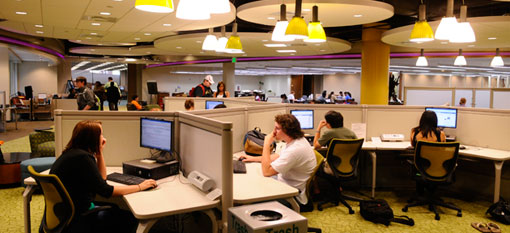 |
Sterne Library’s renovation increased common space to encourage collaboration and discussion among students. Additional outlets help members of the digital generation recharge all of their technological tools. |
5. The library is a reliable source.
While answers now come easily thanks to online search engines, accuracy does not. “Most people believe that everything they touch on the Internet is factual and free,” Stephens says. “That’s a big misconception. The Internet doesn’t use standard vocabularies; you can’t be sure you’re dealing with validated sources.”
Plutchak concurs. “Much more content is available electronically. The downside is that it is more difficult to find exactly what one needs when it’s needed.” But, he adds, librarians develop programs, systems, and services to help users locate accurate and useful information. Libraries also cover the costs of that data. “High-quality information required for learning and research has to be paid for,” Plutchak says.
For those reasons, libraries will always be around, say both directors. They don’t foresee a final chapter for printed books, either. “Digital products and readers are not going to replace every single book,” Stephens says. “The book is still the best instrument for reading. You don’t need any special software, an Internet connection, or electricity. You can sit on the beach or in a park—you can do whatever you want—and take a book with you.“
Links:
Lister Hill Library of the Health Sciences
Mervyn H. Sterne Library